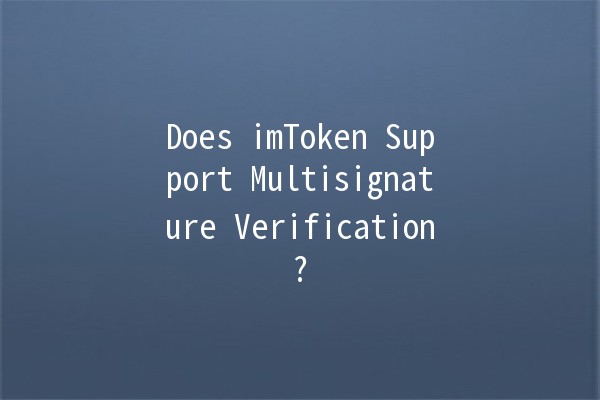In the world of digital assets, security is of utmost importance. As more individuals and institutions turn to cryptocurrency wallets to store their assets, the demand for enhanced security measures continues to grow. One such measure that has garnered significant attention is the multisignature (multisig) verification process. In this article, we will explore if imToken, a popular digital wallet, supports multisignature verification and delve into the importance of this feature in safeguarding digital assets.
Multisignature verification is a security feature that requires multiple parties to authorize a transaction before it is executed. This means that rather than having a single individual hold the keys to a wallet, several individuals must sign off on any transaction. This process adds an additional layer of security and is particularly beneficial for businesses or groups managing shared funds.
Example of Multisig in Action:
Consider a company that has three executives. To make any major financial decision, all three must agree and provide their signatures. In the digital world, this is similar to requiring multiple private keys to authorize a cryptocurrency transaction.

To determine whether imToken supports multisignature verification, we need to assess its features and functionalities.
imToken is known for its userfriendly interface, supporting a variety of cryptocurrencies, decentralized applications (dApps), and the ability to manage assets seamlessly. However, when it comes to multisignature wallets, the support provided by imToken may not be as straightforward as with some other wallets in the cryptocurrency ecosystem.
As of the latest updates, imToken does not inherently support multisignature wallets. Users looking for multisig functionality often turn to other wallets that provide this feature natively, such as Gnosis Safe or BitGo.
Institutional Use: Organizations managing large funds may require multisig for added safety, which is not feasible with imToken.
Personal ance: Those who prioritize their personal asset security also benefit from multisig as it protects against unauthorized access effectively.
While imToken offers robust security measures such as backup recovery phrases, biometric security, and hardware wallet integration, the absence of multisignature functionality limits its appeal to users specifically seeking that solution.
To enhance overall productivity when managing cryptocurrency assets, here are five practical tips:
Explanation: Utilize both hot wallets (like imToken) for daily transactions and cold storage (hardware wallets) for longterm holding.
Application Example: Keep small amounts for trading in imToken for ease of access, but store the bulk of your assets in a hardware wallet like Ledger Nano for increased security.
Explanation: Always enable 2FA wherever possible to enhance security.
Application Example: Use apps like Google Authenticator or Authy to generate timebased onetime passwords to provide an extra layer of protection when accessing sensitive accounts.
Explanation: Keep abreast of the latest security threats and protection methodologies.
Application Example: Follow trusted cryptocurrency news outlets, blogs, and social media channels focusing on cybersecurity trends and updates.
Explanation: Use online tools or services that notify you of significant price movements or transactions.
Application Example: Set price alerts on trading platforms or apps to make timely decisions based on market fluctuations.
Explanation: Regularly back up wallet data to prevent loss of funds due to device malfunctions or misplaced recovery phrases.
Application Example: Store backups in a secure location, like a safety deposit box, and ensure you have access if your device fails.
Multisignature wallets protect digital assets by requiring more than one key to access or transfer funds. They are especially useful for groups or corporations where multiple approvals prevent unauthorized transactions.
Yes, many popular cryptocurrencies like Bitcoin, Ethereum, and Bitcoin Cash support multisignature transactions.
Yes, you can transfer your assets from imToken to a multisignature wallet, although this will necessitate setting up a new wallet first that supports multisig functionalities.
Without multisignature wallets, users face higher risks of unauthorized transactions, loss of funds, or hacking incidents resulting from compromised private keys.
Yes, imToken continues to evolve, implementing new features and security protocols based on user feedback and market trends. However, the addition of multisignature capabilities has not been indicated as an upcoming feature.
If you lose your wallet recovery phrase, your access to the funds may be subsequently forfeited. It’s imperative to keep your recovery phrase secure and backed up in multiple locations.
While imToken does not currently support multisignature verification, it remains a robust wallet option for those seeking a userfriendly interface and strong security features. Users requiring multisig capabilities may want to explore dedicated multisig wallets to ensure their digital assets are protected adequately. For cryptocurrency management, embracing best practices in security, backup strategies, and knowledge accumulation will go a long way in enhancing user productivity and safeguarding investments.